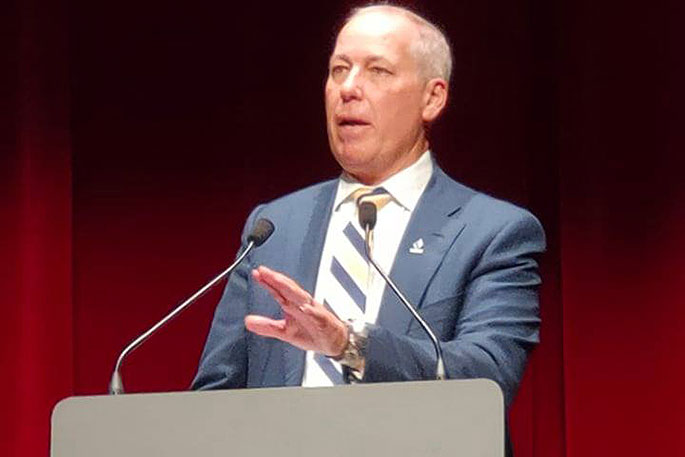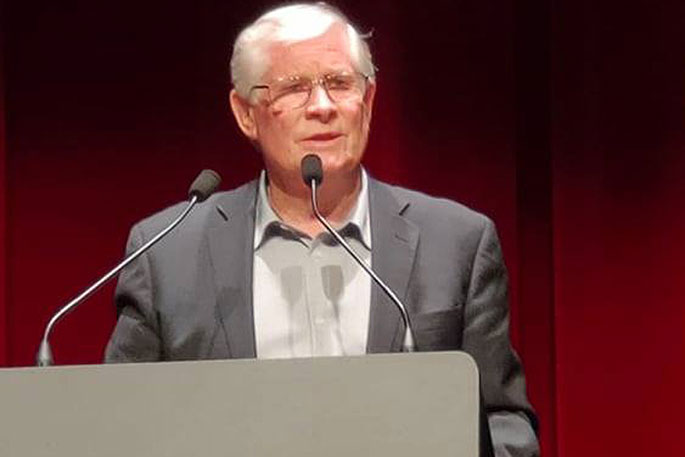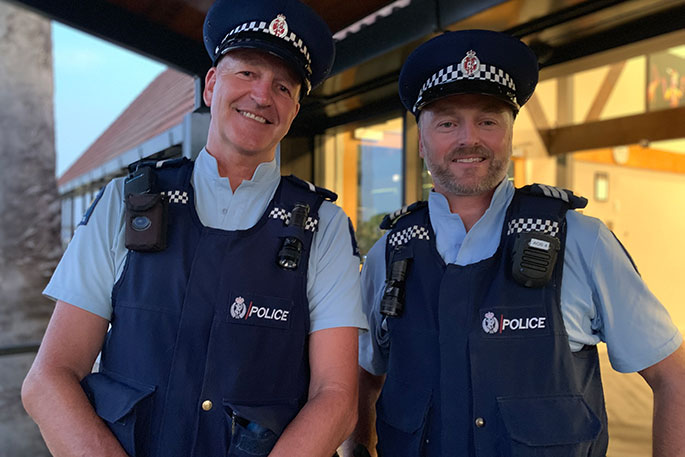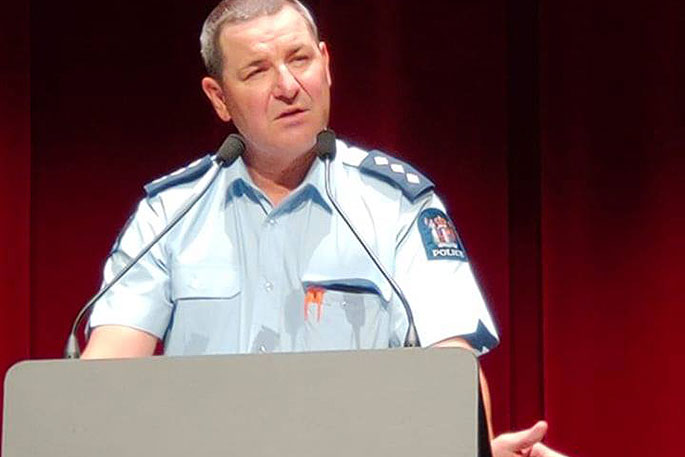‘Gangs are filling a social need' was a comment that stirred the audience in Tauranga last night as solutions were offered to help restore the city's social equilibrium.
More than 350 people gathered in Baycourt on Thursday night for a townhall style meeting called by Tauranga Mayor Tenby Powell, to address the recent spate of gang violence across the Western Bay of Plenty.
Western Bay Mayor Garry Webber, Interim CEO of the Bay of Plenty District Health Board Simon Everitt and Western Bay of Plenty Police Area Commander Inspector Clifford Paxton all took to the stage to address the audience.
Community leaders from local social service organisations, iwi and churches, and some councillors from Western Bay of Plenty District Council, Tauranga City Council, Bay of Plenty Regional Council and board members from the Bay of Plenty District Health Board were present.
Also attending the public meeting were some members of local gangs who had turned their clothing inside out.
'Our approach this evening is that it is an open public meeting,” says Baycourt's manager James Wilson. 'Everybody is welcome. There is a bylaw that no visible gang regalia or patches can be seen in local government buildings so our security tonight have been asked to ask people with visible patches to either leave or cover them up.”
The manager of Te Puna Kokiri, Charlie Rahiri opened the proceedings with a karakia.
Tenby acknowledged Council staff and representatives of the three local Tauranga Moana iwis Ngati Ranginui, Ngai Te Rangi and Ngati Pukenga and then addressed the question on everyone's mind, summed up in four words – why are we here?
'The dynamics of gangs in New Zealand have changed remarkably, it's not just here in Tauranga,” says Tenby.
'The 501s –those who have been deported from Australia, having served a custodial sentence for a crime and then under 501 of the Australian immigration act have been deemed not to have the right character to continue to live in Australia - they have been deported to NZ. For some it's a land they have no knowledge of.
'They may have left New Zealand with their parents at a very early young age and find themselves now back in a country with really very few ties. They bring with them a level of sophistication that we haven't seen here previously. They bring with them international contacts, contacts with the South American drug gangs, the Chinese triad gangs and with that comes a level of violence that we haven't seen in quite this way ever before in New Zealand.”
Tenby emphasised that it was an NZ-wide problem involving the drug scene.
'Fundamentally we're dealing with a meth issue and the distribution of meth. This is, to be crude about it, a turf war.
'Yes, we are New Zealand's fifth largest city, New Zealand's fastest growing city but we are a very small city in the scheme of things. There's not enough room for everybody and there's all this uncomfortable jostling around in this space right now which is causing a bit of angst.”
 Tauranga mayor Tenby Powell. Photo: Grant Dally.
Tauranga mayor Tenby Powell. Photo: Grant Dally.
'The question is ‘how do we deal with it?'” says Tenby. 'People would say to me ‘what's the point of getting everybody together? What's the point of a hui of this sort?' The point of the hui is exactly that – that we are the community who live among all this. And I think we need to acknowledge that gangs come from our community. They are members of our community too.”
'This is about understanding, this is about empathy, and this is fundamentally your safety,” says Tenby.
Tenby acknowledged Western Bay of Plenty Police Area Commander Inspector Clifford Paxton and his team.
'We are blessed to have a calibre of Police force that we have under Clifford's command. They are world-class,” says Tenby.
'We need to thank these men and women in blue,” says Garry Webber. ''It's a thin line, but they've kept us safe, and we really appreciate that.”
Clifford Paxton, the Police area commander then gave some insight into the environment the Police are currently operating in. He spoke about what's changed, what is behind the gang violence in the Western Bay of Plenty, what's happening right now, what are Police doing to protect public safety and where does he see this going from here.
'I saw one commentator refer to this as growing pains,” says Clifford. 'There is no agreement in place that we are aware of which would dictate how these groups conduct themselves in the future. That makes the situation highly volatile. Clearly when someone walks out of a shop front carrying a weapon, our approach is one of immediate response. That will be no surprise to any of you. Store owners don't like Police parked outside their shop front -it's bad for business. Tension exists and we'll continue this approach until tension subsides.”
Running parallel to this approach by Police are their investigative processes.
'The way these groups have traditionally done business is very different from the operating climate here today.
'At a strategic level we continue to put the plan on how we are going to respond to organised crime. That plan involves many different groups at a national, district and area level. Further resources have been put into organised crime at the area level along with repurposing one of our groups to focus on high risk wanted individuals,” says Clifford.
He outlined that a lot of work was going in to holding offenders to account.
'We are well-supported at the national level, with the national organised crime group. Each of our staff have a role - from road policing, criminal investigation focusing on investigating offenders and a public safety team focusing on matters of public interest.”
While the plan requires prioritising and ensuring that resources are focused on where they are needed, clearly matters involving public safety or loss of life will be treated as high priority, says Clifford.
'Tensions still exist and will exist until some equilibrium can be found. I suspect when we say we need to see some rebalancing of the situation which will bring the matter back into equilibrium, some will automatically think about the importation, manufacture and distribution of drugs.
'Methamphetamine, cocaine, ecstasy and synthetics are some of the activities some of these groups are involved in. But again, I think it's much wider than that. It's about how businesses exist and operate in the environment, and that appears at multiple levels.
'Some of these groups have strong familial links into the community and even within and between gangs. Some of this rebalancing to bring it back within equilibrium will be very much at the relationship level. I know for some it will be front of line – how do we move these enterprises or groups from where they are currently to something where they can add value or contribute more positively to society.”
The Police Area Commander continued to explain how the gangs operate, likening them to a business.
'These enterprises are big business. Trying to move or shift an entire enterprise will be a monumental undertaking with all its franchises and national and international links. We should however be open to helping those in these groups who are wanting to change, to transition from their current state or situation that they're in, to something different.”
He emphasised that it's not just a Police effort that's required to bring about the change.
'Whilst I'm open to this, whether it be Police-led or otherwise, clearly our community have a role in this. Helping people to be their best is something that we should all strive for.”
He addressed the question of why gangs were targeting or operating in the Western Bay of Plenty.
 Western Bay Mayor Garry Webber. Photo: Grant Dally.
Western Bay Mayor Garry Webber. Photo: Grant Dally.
'I look at this way, using a business analogy – for a business to be successful, there needs to be the ability to import goods, there needs to be the ability to manufacture goods for sale, there needs to be good distribution networks, there needs to be a market, you have to have a ready supply of resources to manufacture those goods. Unfortunately, from where I sit in Western Bay of Plenty, it seems to offer all of those opportunities and more. It's also a reasonably affluent area.”
Again using a business analogy, he explained that businesses require wealth to grow, to profilerate, and for monopolies to form.
'You either need to restrict wealth creation or remove wealth generated to prevent proliferation or from monopolies forming. If there's no money in it, it's no longer attractive. There remains both the challenge and the opportunity.
'I'm sure there will be others that will tell you it's not about the money, it's about the brotherhood. That might be the case but it's illegal to offend to generate wealth, and with the violence associated with that, it comes to our attention.”
When asked what measures Police had put in place to ensure the safety of the Western Bay communities, Clifford said that he was mindful of not demonising the gangs or getting into name calling.
'My perspective is that if you're wanting to move people forward, you have to have relationship, you have to be able to have a cup of tea.
'At the end of the day, if you've got people's backs up, then it makes it very difficult to move or shift people from where they are currently. We should be treating them with respect as human beings and making sure that we maintain relationships so that we can try and move forward.
'It's far easier to take people with you, when they're on board, than it is if they're off-side,” says Clifford.
Acting CEO of the Bay of Plenty District Health Board Simon Everitt followed the area commander's address, making comments on some of the trends that have been seen in the health system across the Bay of Plenty.
'One of the challenges that we've been seeing is an increasing level of violence or threats towards our doctors, nurses, allied health staff, and non-clinical staff providing care for our patients,” says Simon.
'Over the past year, as an example, we had 217 reported cases of verbal, physical or threatening behaviours towards the health professionals and support staff who are trying to provide care for our sick and those vulnerable. Some of these incidents are related to patients with medical or other conditions but other causal factors relate to altered mental state, the influence of alcohol and drugs, and aggressive behaviours by family members.”
As chief executive, Simon find this to be unacceptable, putting staff in harm's way 'when they're doing their very best to care for patients”.
'We are doing everything we can to manage this, including staff training programmes, temporary placement of additional security resources and other changes to our physical environment to protect our staff. However, this is a much bigger problem than just the health system to resolve, and it's going through quite a significant behavioural and attitudinal changes from our community.”
Simon says the District Health Board also provides a violence prevention programme which screens patients coming into the hospital who may be experiencing violence in the home.
'Another trend we are seeing is the increase in the complexity of people presenting, often with significant issues of violence and drug abuse, with other risks which are really impacting negatively on our families and whanau.
'As further evidence of the challenges we are facing regarding violence in our communities, the Ministry of Justice released on Monday the NZ Crime and Victim Survey which reflects that 79000 adults in New Zealand experience one or more violent offences by a family member,” says Simon.
'Furthermore, there's a strong relationship between family violence and the influence of alcohol and drugs. We also know that health impacts on people who experience violence is significant, with victims experiencing moderate to high levels of psychological stress.
'As a health system, we're here to help provide help, care and support for people who may need assistance as a result of the impacts on their lives of alcohol or drugs.”
The Bay of Plenty District Health Board funds a number of community-based alcohol and other drug services – AOD - across the community that incorporate a range of service delivery approaches to ensure that there is choice for people that need to seek help for addiction difficulties.
The BOP DHB also fund a number of residential AOD services which can include pre and post residential care, and supporting detox options both medical and in the community.
'We are however seeing an increase in the number of people seeking residential treatment for methamphetamine addiction as their primary presenting problem,” says Simon.
'We are aware of the community's concerns about access to local residential services and are renewing discussions about future residential care options in the Tauranga region.
'As a health system, we are experiencing all of the negative impacts of increasing violence in our community. These impacts scan from the broader more fundamental increase in demand on our health services. Helping patients recover and rehabilitate has a very personal and often confrontational impact on our own staff members providing care on the front line.
'The challenges of violence and increasing substance abuse in our community are much bigger than the health systems to resolve and is going to require a concerted community and multi-agency response to make a difference,” says Simon.
'I would suggest one way forward is for the community develop some shared values or a vision of what well-being means to them, and then connect with supporting agencies like ours to resource and partner to achieve that vision.”
Tenby invited questions and comments from the audience.
'This whole concept of coming together, of unity is very important as we go forward. We're not looking to blame but to understand and empathise and come up with some solutions,” says Tenby.
'This is about breaking the cycle,” says Graeme Dingle Foundation's Bay of Plenty Manager Dan Allen-Gordon. 'It is a child and youth problem because they're the ones getting into the gangs.
'Clifford Paxton mentioned that gangs are filling a need that our vulnerable kids have. Our children and youth need really good role models. We need our whole community to step up and go and help organisations that have good strong-structured programmes, and mentor our young people. We need as many people as possible mentoring our kids, and then they'll feel connected.”
Dan highlighted that no one at the public meeting had mentioned the Ministry of Youth Development's Youth Development Strategy.
'Feeling connected is one of the principles of Child, Youth and Development. They need to feel to connected. Mentoring does that,” says Dan.
Chairman of the Bay of Plenty Youth Development Trust Craig Nees encouraged the audience that rather than sitting and talking about what to do 'let's go and do something. They are part of our society.”
Over the last two years Craig Nees and his team have launched the Tauranga Boxing Academy which aims to teaching boxing and fitness to youth, but also instill life values; respect, responsibility, compassion, consideration, kindness, duty, obedience, honesty, truthfulness, and work ethics. Already they've seen a big turnaround in some of the boys who come through the programme.
'We run programmes for at-risk youth predominantly between the ages of nine and 24. We have a new programme starting this year for 16 – 24 year olds that are not employed and they're not in education. What we see is that we have 150 to 160 young people come through our gym facility which is a boxing based programme.”.
'There is no silver bullet to a solution,” says Leon Samuels of the Man Up programme. 'When you start to break it down, pinpoint and say it's a gang problem, you start to shove that underground. Our viewpoint is that unless you get to the ground level, it's where the mahi is done. You got to get into where the issues are. You can come from an academic perspective but if you've lived it and you've come out of it, then there's power there to be able to role model and change or be an example. There's got to be examples, you need to set an example of someone who has come out of the gangs and be now a positive role model within society. I love my city and want to be an impact of change but we've got to work together. Change has got to come from the ground up and it's happening but if it's resourced and helped more I think we can get a greater impact. If you can change the man you can change the home. If you can change the home you can change the community.”
'Our role is to support the Police, to give the Police the space to do their job,” says Western Bay mayor Garry Webber. 'The new technology that's available for all these people means the Police have to get smarter and we have to find new solutions.
 Police officers at Baycourt on Thursday night. Photo: Rosalie Liddle Crawford
Police officers at Baycourt on Thursday night. Photo: Rosalie Liddle Crawford
'There is a spectrum of harmful substances. What's freely available is alcohol in supermarkets and liquor shops, and Councillor Murray-Benge will tell you as she's been on Council longer than I have, that every time we do a local alcohol policy, people come out of the community and say ‘let them be'. This is your community. We get over-confident that we can manage it. Unfortunately we can't.
'We need to take a long hard look at ourselves, because big business runs the biggest harmful substance and they come with lawyers and all sorts of people to defend why we should give them another licence.”
Garry says that the silence from the public around the alcohol applications is deafening.
'That's one thing you can do because these applications are coming through all the time,” says Garry.
'We don't get to choose who lives in our communities,” say Clifford. 'We can however expect certain standards of behaviour. As a community, as Police, it's about us trying to ensure we maintain those standards of behaviour. And collectively we can. You have a voice, and you can report when things aren't the way they are or the way they should be and it's our job to try and respond and to ensure we maintain those behavioural standards.”
Prior to the meeting, one person who wished to remain anonymous commented that Tauranga residents' rates shouldn't be spent on solving issues that are Police matters and Government matters, that that funding should be coming from Government. Following the meeting an attendee addressed that with the comment: 'we need someone to advocate for our community at Government level”.
The Police area commander closed his address with key points for the public to take action on.
'We ask our communities to remain calm, to remain vigilant, to remove yourself from the situation, and to report what you see, and to keep yourselves and your family safe.”



2 comments
Strutting peacocks
Posted on 21-02-2020 18:45 | By I B Stornche
Looks like all feathers and no actions. A council and mayor pretending to be tough on crime when its the job of Police. They're also so tough they'll hand the city back to the abusive beggars.
Gangs
Posted on 22-02-2020 07:36 | By socantor01
The public are the reason gangs thrive. If we didn't buy their drugs, the problem would largely disappear. Those who buy drugs may think they are being smart, or "with it", but in reality they are doing huge damage to themselves and our communities. Of course, alcohol is our biggest drug problem, but until there is a major attitudinal change to our liking for alcohol, it, like all the other "social " drugs, will continue to be our biggest killer. So, all you lawyers, accountants, real estate agents, housewives, truckies, etc need to have a good hard look at yourselves and the reasons you are sick and are making our communities sick by being a drug user and drug buyer.
Leave a Comment
You must be logged in to make a comment.